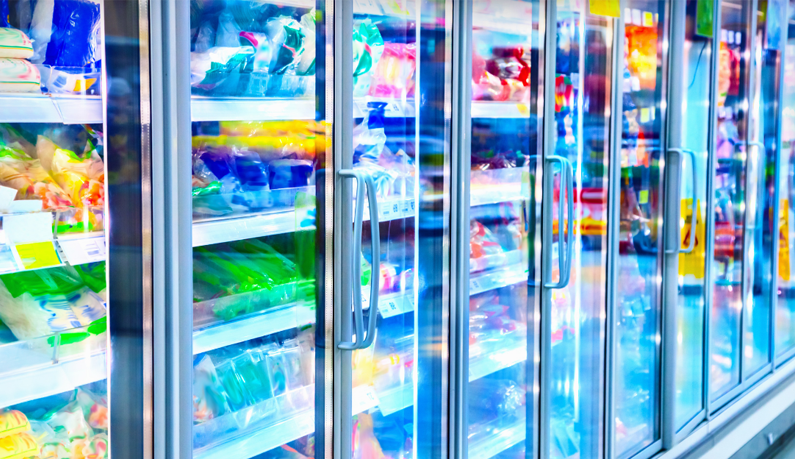
The expectation of frozen food manufacturers from packaging is to have a quality seal which remains intact in sub-zero temperature conditions.
A successful end-of-line packaging process in frozen food manufacturing presents unique application challenges and it is important to understand how adhesives impact the quality of packaging.
Hot Melt Adhesives in Sub-Zero Environments
The production environment of frozen food packaging is constantly evolving. Some frozen food packaging applications are more complex than others and create specific challenges. Products that are manufactured with a blast freezer require highly precise control of the adhesive temperature for maintaining the adhesive properties and to provide a high quality quality seal.
Frozen waffles, for example, are normally bagged and placed in cartons inside a cold room. A hot melt adhesive is then applied at 177°C to the carton flaps before entering a blast freezer. This transition involves a huge temperature change – from a 5°C environment to -40°C environment within a short time.
Maintaining Consistent Adhesive Temperature
Frozen food packaging requires a quality case as well as carton seal and adhesive temperature control is very important. Inconsistent adhesive temperature leads to uncertainty with the effectiveness of hot melt applications. Adhesives which show temperature fluctuations may hold and stay intact when leaving the plant, but are likely to fail within a 24 – 48 hour period.
Two most common causes of inconsistent adhesive temperature are often associated with operator intervention and tank-based hot melt equipment.
Maintaining consistent adhesive temperature with most tank-based hot melt systems usually requires constant temperature-setting adjustments. Swings in adhesive temperature also occur if operators allow tank-based melters to run low and later fill them up with unmelted adhesive. Without proper recovery time, usually over 45 minutes, the adhesive temperature could drop significantly which makes the bond susceptible to failure.
Surface Conditions
When considering surface considerations, the substrate being used is also an important factor.
- How smooth or rough is the substrate?
- Is the substrate flat or curved?
- Is surface energy low or high?
- Are there any surface-contamination concerns?
For example, water is often considered to be a surface contaminate in the frozen food industry because it can affect how well a pressure-sensitive label will bond to the surface it is applied to.
The following are some ways to measure and test how surface conditions will affect adhesive performance.
Initial tack: This is used to define how fast a bond will form between the adhesive and surface. If the initial tack is high adhesion to the surface will be high.
Peel strength: This determines the strength with which the adhesive bonds to the surface. This is measured by the force required to break the bond using standard parameters such as the peel direction or angle, time of bond and application pressure.
Shear resistance: This is a measure of the adhesive bond’s durability. A high-shear adhesive is firm and does not flow very well into a surface which equates to a lower initial tack. However, there’s less likelihood of a split if the bond is stressed.
Why Aggressive Adhesives Can Be Dangerous
Manufacturers have developed adhesive materials formulated to withstand temperatures as cold as -40°C. The appeal to frozen food manufacturers is that aggressive adhesives prevent pop-opens from occurring.
However, using aggressive adhesives can lead to increased char. In most cases aggressive adhesives quickly degrade under extreme temperature conditions.
Manufacturers can make the glue hotter and apply more adhesive than normally required. However, this increases adhesive consumption and the risk of nozzle plugs getting charred which compromises the quality of the resulting seal.
Suitability Without Compromising Safety
While many adhesives may be marketed as being suitable for food packaging, this could only imply that they meet the physical performance requirements for use in packaging. However, it does not necessarily mean the adhesive has been tested for a specific packaging application.
Using adhesives without carefully considering whether they are suitable for use in packaging material for frozen food items can result in contamination. The repercussions could be a damage to brand reputation, lawsuits and public censure.
Millions of dollars could be lost in lost sales if food items have to be removed from shelves in retail stores and destroyed.
With manufacturers and frozen food packaging companies feeling the pressure to take on more ownership of materials used in packaging products, they are collaborating closely with adhesives manufacturers to arrive at solutions that meet their requirements.
This is helping them enjoy long term benefits of cost reductions, improved brand reputation, increased trust from customers and expanded market share.
Matching Adhesives to Application
Before deciding on an adhesive, frozen food manufacturers or packers should dive into the specific considerations of the end application for best pairing of the adhesive with the application.
Does the application require a cold-temperature, all-temperature, freezer-grade, direct food contact or freezer grade adhesive?
For example, cold temperature adhesives can work in temperatures which are as low as -20°F. However, adhesives which are not designed for cold temperatures will stiffen and lose strength with decreasing temperature.
ABC Adhesives can supply a range of Adhesive solutions such as TechnoMelt or SuperiorMelt – read more about our Packaging Products.
If you are looking for an adhesive solution for your frozen packaging, get in touch with one of our adhesive experts for a Free Adhesive Analysis. Contact us on 07 3266 8699 or CLICK HERE to send us a message.

